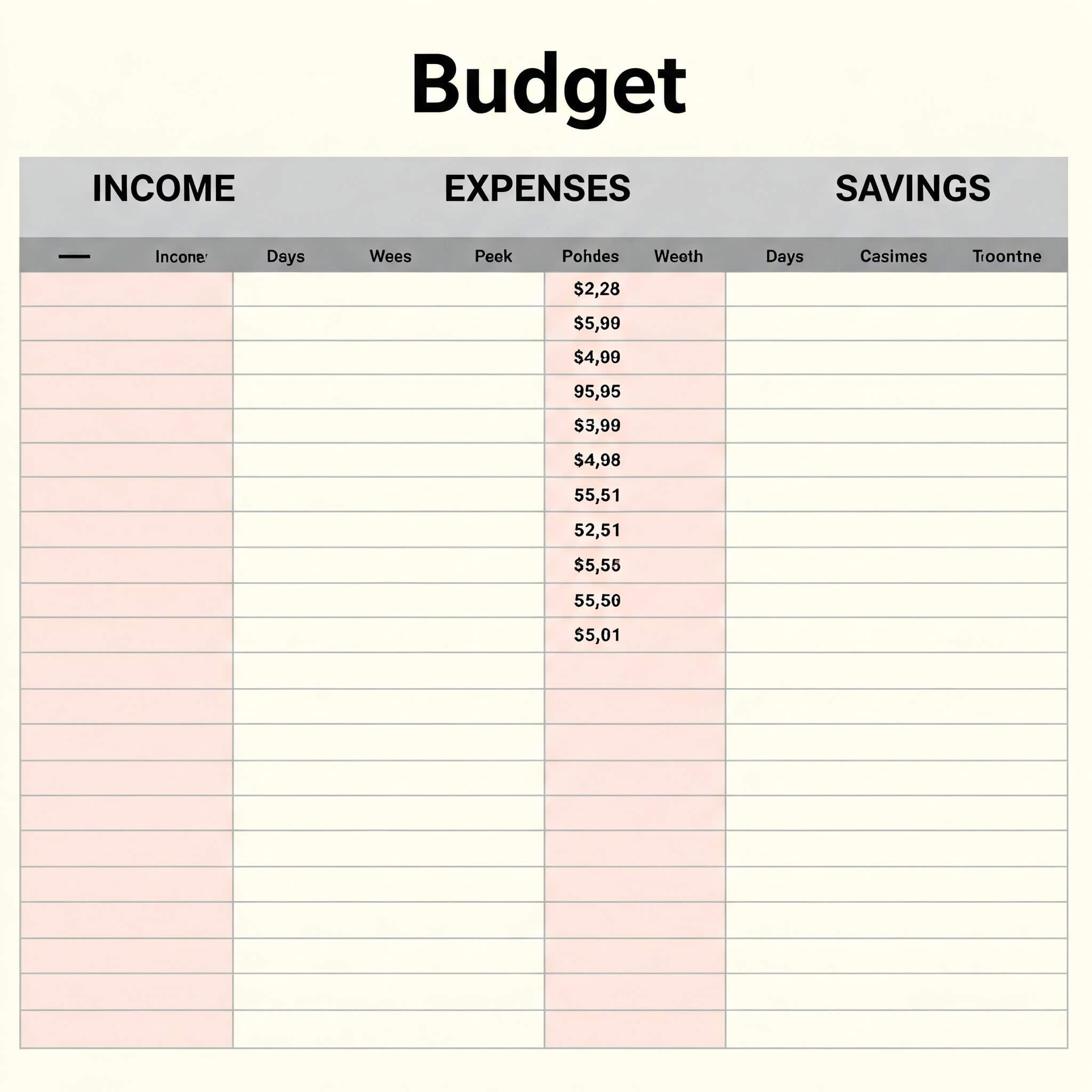Budgeting can be overwhelming when you're gazing at a stack of bills, a dwindling bank account that's shrinking quicker than you'd prefer, and a list of things you still need to buy. It’s easy to get lost in the numbers, but there’s one question that can help you cut through the chaos: In your budgeting process, when should you look at recurring expenses? Those regular, predictable costs—like rent, utilities, or that gym membership you swore you’d use—play a massive role in how your money flows each month. Figuring out when to tackle them can be the difference between a budget that works and one that falls apart.
In this e-book, we're going to dive deep into what recurring expenses are all about, discuss when to examine them in your budgeting, and provide you with easy, no-brainer advice on how to keep your finances in order. Whether you're a budgeting beginner or a long-time veteran, this is for you. Let's begin and get your money in order, step by step.
What Are Recurring Expenses, Anyway?
Before we get into In your budgeting process, when should you look at recurring expenses?, let's get on the same page regarding what they are. Recurring expenses are the payments and bills that appear like clockwork—every month, every quarter, or even every year. They're not the occasional coffee stop or that impulsive purchase at the store.
These are the fixed expenses you can't simply avoid: consider rent or mortgage, auto insurance, cell phone bills, internet, subscription services like Netflix or Spotify, and perhaps even that college-loan payment that's been lingering since graduation. So why are they so important? Because they are the pillars of your financial world. If you don't know what's leaving your wallet every month on these essentials, you're essentially winging it with the rest of your money. During your budgeting exercise, when do you want to examine recurring costs? The answer is short: sooner rather than later. But don't worry—today, we'll take it step by step so that you'll have a clear idea of when and why. To start with, just imagine recurring costs as the roots of a tree.
If the roots are shaky, the whole thing’s at risk of toppling over.
Why Recurring Expenses Can Make or Break Your Budget Let’s get real for a second. Recurring expenses aren’t just numbers on a spreadsheet—they’re the heartbeat of your budget. Ignore them, and you’re setting yourself up for a stressful month. Listen to them, and you've got a fighting chance to actually save some money or splurge without remorse. So, In your budgeting process, when should you look at recurring expenses?
It's a question that's worth asking because these expenses can creepily devour more than half your salary if you're not watchful. Consider rent, for instance. For a lot of people, it’s the biggest chunk of their monthly spending—sometimes 30%, 40%, or even more of their paycheck. Add in utilities, a car payment, and a couple of subscriptions, and suddenly you’re wondering why there’s nothing left for groceries. That’s why timing matters.
Knowing when to focus on these expenses helps you build a budget that’s realistic, not just a wish list of how you hope your money will behave.
In your budgeting process, when should you look at recurring expenses? Three Smart Approaches
Okay, on to the juicy stuff: When in your budgeting, should you consider recurring expenses? There is no hard and fast rule, but there are several tried-and-true methods that work based on your style and objective. Here's a summary of three possibilities to consider.
H3: Approach 1: Take Them On First Thing One tried-and-true method is to consider recurring expenses first thing. In your budgeting, when should you review ongoing expenses? If you're a "get the big things out of the way" type of person, then the answer is: the minute you sit down to budget. Fire up your laptop, get out your bank account, and begin writing down every recurring expense you can recall.
Rent, utilities, insurance, that odd app you don't even use anymore—put it all on paper.
Why begin here? Because these are the absolute necessities. You can't miss your rent or have your phone shut off (you could, but it won't be pleasant). By determining these expenses first, you have a clear picture of how much money's already accounted for. Then, you can budget the rest—such as food, gas, or a night on the town—with what's remaining. It's like building the foundation of a house before decorating the rooms.
Approach 2: Once You Know Your Income
One other option is to begin with your pay, and then ask, When In your budgeting process, when should you look at recurring expenses? For this method, you would add up everything that comes in each month—your paycheck, any side income, perhaps some money from selling old items on the internet. After you have that total, you would then subtract your recurring expenses to determine how much is left over.
This approach's perfect if you're a high-level thinker. You like to see the total pot of money before you go about slicing it up. It's not so much about the sequence and more about ensuring the numbers are reconciling. Either way, periodic expenses are still a priority—you're just framing them in relation to what you're taking in. It's similar to looking at how much gas is in your tank before you map out a road trip.
Approach 3:
During a Monthly Review Here's a third alternative: don't worry about recurring expenses at the beginning. Instead, consider them as part of a routine check-in. When you're budgeting, when should you consider recurring expenses? How about once a month, when you're taking inventory of how things went? Perhaps your rent is the same each month, your car payment is fixed, and your subscriptions are unchanged.
Then you can install them once and just adjust as necessary—such as when your electric bill goes up or you finally quit that magazine you never look at.
This is most effective if your ongoing expenses are fairly fixed. It's less stress initially and allows you to concentrate on the variable things—such as food or entertainment—first. Then, you come back and ensure the fixed expenses still work. It's a relaxed method of keeping your budget running smoothly.
Why Timing Is Everything in Budgeting
So, In your budgeting process, when should you look at recurring expenses? It's not about choosing some arbitrary time—it's about discovering a rhythm that keeps your finances under control. Get the timing wrong, and you could end up overspending before you even know it. Get it right, and you'll be a money wizard.
Consider it like preparing dinner. If you don't check how much rice you have before boiling the water, you could end up with an inadequate pot—or no rice. Budgeting is the same way. During your process of budgeting, when do you want to review recurring expenses? Ideally, when they will give you the big picture without sidetracking you. That's what we're shooting for here.
How to Track Down All Your Recurring Expenses (Even the Sneaky Ones)
So that you can respond In your budgeting process, when should you look at recurring expenses? , first you need to know what they are. It sounds easy, but many of us have expenses we don't even realize are there until they've sucked dry our accounts. Here's a step-by-step method to track them down:
Drill Down Through Your Bank Records: Bring up the previous two or three months of activity. Find anything that keeps popping up regularly—week after week, month after month, whatever. Highlight those suckers.
Monitor Your Subscriptions: Open up your phone or email and browse through for stuff with words such as "subscription" or "renewal." You'll be amazed how many small $5 or $10 charges lurk there.
Consider Your Habits: What do you pay for consistently? Rent, auto insurance, your child's soccer membership—anything that's regular gets on the list.
Ask Around: If you live with someone or have a partner, double-check with them. Perhaps they're paying something you forgot to consider.
Once you've got your list, you're ready to feed it into your budget. But when? Yep, we're going back round again In your budgeting process, when should you look at recurring expenses? Hold on in there—we're going to get it all out.
In your budgeting process, when should you look at recurring expenses? A Step-by-Step Plan
Let's get this really useful with a step-by-step budget plan that responds In your budgeting process, when should you look at recurring expenses? in a manner that you can practically apply. This isn't some sophisticated financial speak—it's merely a simple means of handling your money. Here we go:
Step 1: Begin with Your Income
First things first: how much money's coming in? Take your paycheck, any freelance work, or that birthday money from your grandma. Write it down. This is your starting point.
Step 2: List Your Recurring Expenses
Next, in your budgeting, when do you consider recurring expenses? Right here, following income. Grab that list you created—rent, utilities, subscriptions, everything. Total them up. This is the money that's already spent before you even consider anything else.
Step 3: Do the Math
Take your income and deduct those recurring expenses. Whatever is left is your "flexible" money. This is what you have for groceries, gas, savings, or that new pair of sneakers you've been wanting. By considering recurring expenses first, you prevent yourself from overspending on fun things and then trying to make the basics work.
Step 4: Budget the Rest
Now, plan out your variable expenses—like food, entertainment, or gifts—and set some aside for savings if you can. In your budgeting process, when should you look at recurring expenses? Before this step, so you’re not guessing how much you’ve got to play with.
Step 5: Review Monthly
Once your rolling budget is going, check in monthly. Did your recurring expenses shift? Did your rent increase? Did you subscribe to a new streaming platform? Tweak as necessary. This keeps your plan current and stress-free.
This process is easy, flexible, and—most importantly—achievable. You don't have to be a finance major to make it happen.
Common Budgeting Errors with Recurring Expenses
Even when you aced your budgeting process, when to examine recurring expenses?, there are methods to slip up. Here are some trapdoor moments to avoid:
Ignoring Small Costs: A $3 app here, a $7 subscription there—adds up quicker than you'd expect.
Assuming They're Static: Rent could go up, utilities could surge during winter, or your auto insurance could rise after a rate increase. Don't set it and forget it.
Not Canceling Unused Stuff: Still shelling out for that gym you haven't visited since January? Time to let it go.
Forget about Annual Fees: Certain repeat payments—such as a professional membership or credit card fee—hit only annually. They will take you by surprise if you're not prepared.
Avoid those, and your budget will chug along in harmony.
During Your Budgeting Process, At What Point Do You Consider Recurring Expenses? True-Life Stories
Let's make it real with a couple of examples. Here's how two different individuals respond In your budgeting process, when should you look at recurring expenses? in their own manner.
Story 1: Jenna, the Budgeting Newbie
Jenna's 25, newly employed full-time, and wants to get off the paycheck-to-paycheck cycle. She takes a seat with her income ($2,800/month) and asks, In your budgeting, when should you consider recurring expenses? She decides: now. She tallies her rent ($1,100), utilities ($120), phone ($60), and a few memberships ($30). That's $1,310 down the drain. With $1,490 remaining, she budgets for food, gas, and a small savings account.
For Jenna, beginning with recurring expenses brings it all into focus and gives her confidence.
Story 2: Carlos, the Experienced Planner
Carlos is married, 40 years old, and has been budgeting for years. He begins with his family income ($6,000/month) and then inquires, In your budgeting process, when should you look at recurring expenses? For him, it's reviewing them monthly. His recurring expenses—mortgage ($2,000), utilities ($300), insurance ($200), and subscriptions ($50)—equal $2,550. He reviews them later to determine if anything's changed, such as when his internet bill increased $15. This makes his budget flexible and stress-free.
Both Carlos and Jenna make it work—their way. It's all about finding your groove.
Pro Tips to Master Your Recurring Expenses
Knowing In your budgeting process, when should you look at recurring expenses? is just the beginning. Here's how to take it to the next level:
Trim the Fat: Review every subscription and ask, "Do I really use this?" Cancel anything that's just gathering dust.
Negotiate Like a Boss: Call your cable provider, insurance company, or phone company and demand a better price. You'd be amazed at how frequently it works.
Set Up Alerts: Set up notifications on your bank app when a recurring payment comes through. It's a simple way to stay on top of it.
Automate Wisely: Set bills to auto-pay to prevent late fees, but review the amounts every month to catch mistakes.
These small adjustments can end up saving you hundreds in the long run.
In your budgeting process, when should you look at recurring expenses? The Bottom Line
So, then, after all of this, what's the bottom line on In your budgeting process, when should you look at recurring expenses? The ideal time is early—after you know your income—so you have a good sense of your fixed expenses. Then, review them each month to keep it all in balance. It's not about perfection; it's about awareness.
Recurring expenses are the rhythm of your budget—consistent, predictable, and necessary. Bring them into line, and the rest will fall into place. Whether you're beginning anew or tweaking an existing system, respondingIn your budgeting process, when should you look at recurring expenses? is your key to financial peace In your budgeting process, when should you look at recurring expenses?.
Your Next Steps: Take Charge of Your Budget Today
Budgeting doesn't have to be boring. By asking yourself in the budgeting process, when do you need to review recurring costs? and following through, you're already well ahead of the game. Start small: pull out your income, write down those recurring costs, and add on from there. It's not about trendy apps or sophisticated equations—it's about being aware of where your money's heading and getting it to work for you. The next time you're gazing at your bank account, ask yourself: At what point In your budgeting process, when should you look at recurring expenses? Then do it. You'll feel lighter, smarter, and prepared to handle whatever comes your way. Your money's waiting—go take control of it!





